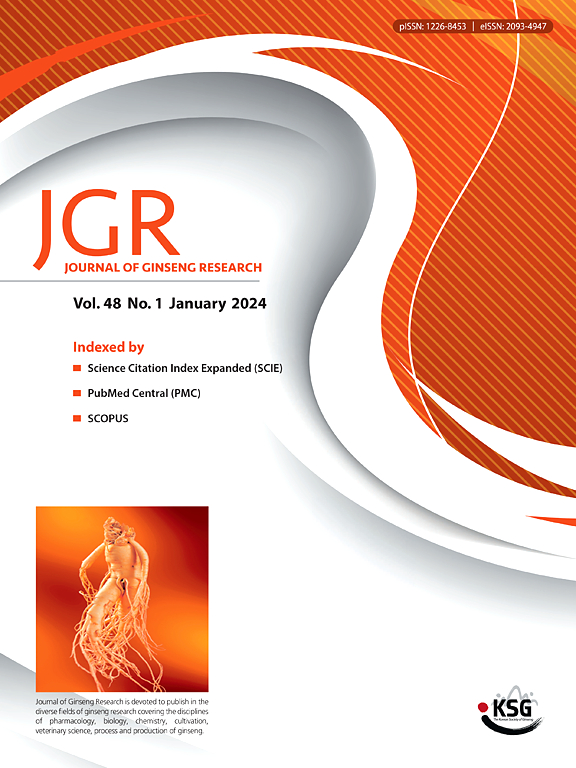Korean black ginseng extract alleviates Alzheimer's disease-related cognitive impairment by activating the Nrf2/HO-1 pathway and suppressing the p38 MAPK/NF-κB/STAT3 pathways and NLRP3 inflammasome via TLR2 and TLR4 modulation
IF 6.8
2区 医学
Q1 CHEMISTRY, MEDICINAL
引用次数: 0
Abstract
Background
Korean black ginseng, a specially processed ginseng through repeat steaming and drying, has various pharmacological effects. However, its role in cognitive impairment remains unclear.
Purpose and methods
This study examined whether Korean black ginseng extract (BGE; 50 and 100 mg/kg, orally, 18 weeks) may mitigate cognitive impairment in a 5xFAD mouse model of Alzheimer's disease (AD).
Results
BGE significantly improved cognitive performance in 5xFAD mice, associated with reduced Aβ accumulation in the frontal cortex and hippocampus. BGE suppressed microglial and astrocytic activation, alongside the downregulation of pro-inflammatory cytokines (interleukin-6 and tumor necrosis factor-α) and enzymes (cyclooxygenase-2 and inducible nitric oxide synthase). These changes coincided with the inhibition of key inflammatory signaling pathways, such as p38 mitogen-activated protein kinase (MAPK), nuclear factor kappa B (NF-κB)/p65, signal transducer and activator of transcription (STAT) 3, and NOD-like receptor protein 3 (NLRP3) inflammasome. Furthermore, BGE reduced the generation of reactive oxygen species and enhanced the nuclear-E2-related factor 2 (Nrf2)-heme oxygenase 1 (HO-1) signaling pathway in the brains linked to the downregulation of toll-like receptors (TLR)-2 and TLR-4 in the brain.
Conclusion
Taken together, BGE could improve AD-related cognitive decline and neurodegeneration by simultaneously regulating anti-inflammatory pathways (p38 MAPK/NF-κB/STAT3 and NLRP3 inflammasome) and an antioxidant pathway (Nrf2/HO-1) via modulation of TLR2/4.

黑参提取物通过TLR2和TLR4调节激活Nrf2/HO-1通路,抑制p38 MAPK/NF-κB/STAT3通路和NLRP3炎性体,减轻阿尔茨海默病相关认知功能障碍
韩国黑参是一种经过反复蒸干加工而成的人参,具有多种药理作用。然而,它在认知障碍中的作用仍不清楚。目的与方法研究高丽黑参提取物(BGE;50和100 mg/kg,口服,18周)可能减轻5xFAD阿尔茨海默病(AD)小鼠模型的认知障碍。结果bge显著改善5xFAD小鼠的认知能力,减少额叶皮质和海马中Aβ的积累。BGE抑制小胶质细胞和星形胶质细胞的激活,同时下调促炎细胞因子(白细胞介素-6和肿瘤坏死因子-α)和酶(环氧合酶-2和诱导型一氧化氮合酶)。这些变化与关键的炎症信号通路,如p38丝裂原活化蛋白激酶(MAPK)、核因子κB (NF-κB)/p65、信号传导和转录激活因子(STAT) 3、nod样受体蛋白3 (NLRP3)炎症小体的抑制一致。此外,BGE减少了活性氧的产生,增强了大脑中与toll样受体(TLR)-2和TLR-4下调相关的核e2相关因子2 (Nrf2)-血红素加氧酶1 (HO-1)信号通路。结论BGE可通过调节TLR2/4同时调节抗炎途径(p38 MAPK/NF-κB/STAT3和NLRP3炎性体)和抗氧化途径(Nrf2/HO-1),改善ad相关认知能力下降和神经退行性变。
本文章由计算机程序翻译,如有差异,请以英文原文为准。
求助全文
约1分钟内获得全文
求助全文
来源期刊

Journal of Ginseng Research
CHEMISTRY, MEDICINAL-INTEGRATIVE & COMPLEMENTARY MEDICINE
CiteScore
11.40
自引率
9.50%
发文量
111
审稿时长
6-12 weeks
期刊介绍:
Journal of Ginseng Research (JGR) is an official, open access journal of the Korean Society of Ginseng and is the only international journal publishing scholarly reports on ginseng research in the world. The journal is a bimonthly peer-reviewed publication featuring high-quality studies related to basic, pre-clinical, and clinical researches on ginseng to reflect recent progresses in ginseng research.
JGR publishes papers, either experimental or theoretical, that advance our understanding of ginseng science, including plant sciences, biology, chemistry, pharmacology, toxicology, pharmacokinetics, veterinary medicine, biochemistry, manufacture, and clinical study of ginseng since 1976. It also includes the new paradigm of integrative research, covering alternative medicinal approaches. Article types considered for publication include review articles, original research articles, and brief reports.
JGR helps researchers to understand mechanisms for traditional efficacy of ginseng and to put their clinical evidence together. It provides balanced information on basic science and clinical applications to researchers, manufacturers, practitioners, teachers, scholars, and medical doctors.
 求助内容:
求助内容: 应助结果提醒方式:
应助结果提醒方式:


